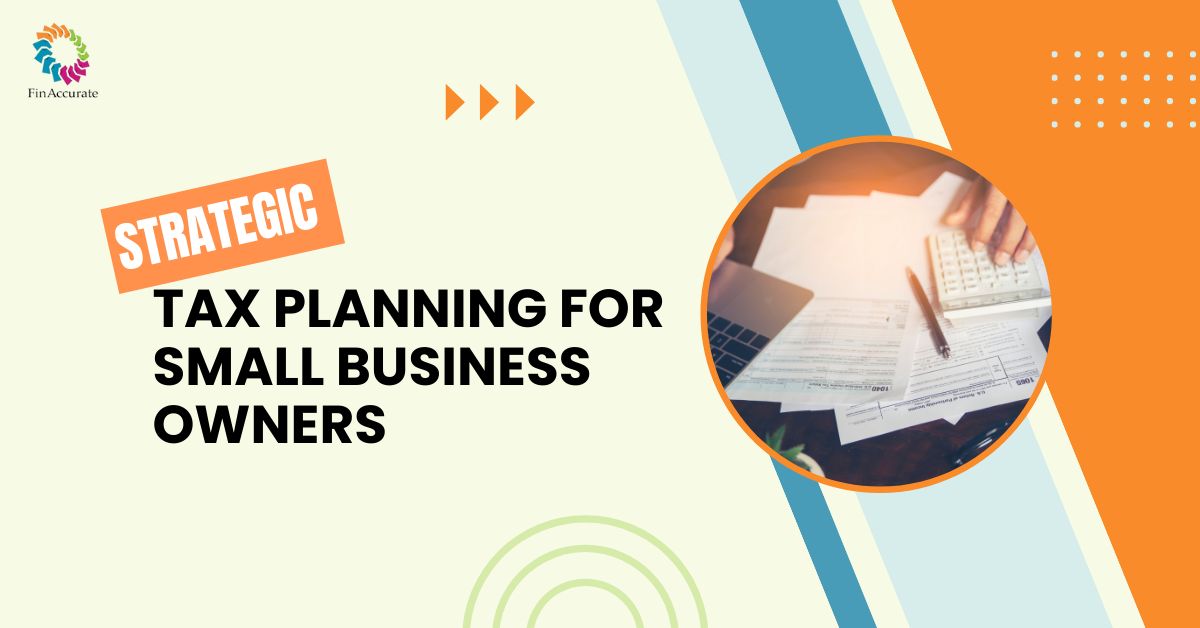As a small business owner, maximizing profits is essential to ensure long-term success. One way to achieve this is through strategic tax planning. By understanding how to optimize tax savings, small business owners can keep more money in their pockets and invest back into their businesses. In this blog, we’ll explore essential tips and strategies for small business owners to help them navigate the complex world of taxes and boost their bottom line.
As satisfying as it is for a small business to make more money, having to pay more in taxes can more than make up for it. Taxes from the state and federal governments, taxes on self-employment, and extra taxes all add up to a heavy load. Because of this, tax planning is important for the success and growth of your business. This article will show you how to lower your tax bill and make better tax plans for your small business. When a business makes a lot of money, it needs to plan its taxes carefully and use more than one strategy. The goal is to use them successfully.
Also Read: Strategic Tax Planning for Small Business Owners
#1: Check the Legal Formation of the Company
When starting a business, entrepreneurs have a lot of choices. You can choose between being a sole owner, a partnership, a limited liability company (LLC), an S corporation, or a C corporation. How you file taxes for your small business depends on how you set up your business. But you don’t have to stay in any of them forever.
As small businesses grow, the format can be changed to better fit the size of the business. For example, limited liability companies (LLCs) can choose to be taxed like C corporations by sending the IRS Form 8832.
Corporate income tax does not apply to pass-through companies like sole proprietorships, partnerships, LLCs, and S corporations. In these situations, the net income of the business “passes through” to the small business owner’s personal tax bill, which has a 37 percent highest tax rate. If members of an LLC who are in the highest tax rate change how their business is set up, they can save a lot of money on taxes.
If the U.S. Congress raises the company tax rate to 26.5 percent, the 21 percent rate might be a thing of the past. Still, tax savings aren’t the only reason to change the way a business is set up. By talking to a good tax expert, a small business owner can make an informed choice about what kind of business entity to use.
#2: Take All Legitimate Tax Deductions
The IRS code includes tax deductions to encourage you to do certain things with your money and stop you from doing other things that could get you into a lot of trouble. For example, donations to religious groups and other charities are tax-deductible, which encourages people to give easily to their charitable work. To get the economy going, the rule lets small businesses take advantage of a lot of tax breaks. Among other things, these have to do with:
- Getting your product or service in front of buyers’ eyes through marketing and advertising is a good way to make more money.
- Insurance covers any trouble or liability that comes up in the normal run of business.
- Business meals are important because everyone needs to eat, and talks over food help both the bottom line and the hunger.
- Travel is also a regular business cost that can be deducted from qualified business income.
- Education, whether it leads to a degree or not, is an investment in the future of both the employee and the business.
- Contributions to a retirement plan are seen as a good thing by the ITS, so they are often tax credits.
Tax law understands that there are tax breaks for a lot more things, and it’s best to know where to look. Accountants and tax experts who work professionally can find many tax deductions for small businesses that you can use.
Also Read: Tax Deductions Guide: 20 Popular Breaks
#3: Utilize COVID-19 Aid
Smart tax planning looks for several tax deductions. COVID financial aid from the Coronavirus Aid, Relief, and Economic Security Act (CARES) reduces taxes. This was a jobs act to keep workers employed while business owners struggled. This law includes:
Retention Bonus
Small businesses can get a tax credit for Social Security payments using the Employee Retention Credit. Small business owners who can prove one of two events apply for this every fiscal quarter:
1) The government ordered the tiny business to close to prevent COVID-19. A restaurant, bar, bowling alley, barber shop, hair salon, motel, professional sports franchise, or other non-essential small business could be subject to such a regulation.
2) Pandemic-related shutdowns and economic slowdowns cost small businesses a lot of money. If eateries close, suppliers lose business. They may receive tax credits if they can prove the epidemic caused it.
Sick Leave Credits
The Families First Coronavirus Response Act of 2020 helps small businesses provide two weeks of paid sick time. Small enterprises must pay workers who were quarantined and receiving medical care. If the employee remains home to care for a quarantined COVID-19 family member, they receive 66% of their regular income.
The American Rescue Plan Act of 2021 extended both tax code provisions until September 2021. Small business taxpayers can modify their tax returns to apply for some of them retrospectively under current tax rules. IRS Form 941-X is needed.
#4: Delay or Accelerate Income
Tax planning may require delaying revenue streams. Billing in mid-to-late December ensures payments in January of the following tax year. Tax deferral is not evasion. Funds will be taxed. It delays tax payments until the following year.
Other tax planning strategies involve accelerated income. Business owners may optimize profits before a tax hike. They might increase billing and collections before the tax year ends. They can postpone bills or purchases until the new year. This preserves operating capital for tax filing.
#5: Shrink Your Changed Gross Income
When figuring out a person’s gross income, you add up all of their income sources, such as sales, wages, business income, stock dividends, capital gains, and retirement account proceeds, among other things. The Adjusted Gross Income (AGI) takes into account money that is moved for a certain reason.
These include money an employer puts into a retirement account, alimony paid to a former spouse, interest paid on student loans, and costs linked to what teachers need. The best way for small businesses to plan their taxes is to keep their AGI as low as possible.
This can be done in different ways. One way is to put money into health savings accounts for employees. Another way to bring down AGI is to put more money into a retirement plan, up to the limit of what the law allows.
For people who run their own businesses on their own, the home office credit, if it applies, can lower their AGI by a lot when it comes to self-employment taxes. Also, interest paid on company loans, real estate, equipment, and other things can often be taken out of gross income to lower AGI.
#6: Optimize Retirement Savings Accounts
Tax planning is important for many small businesses that only have a small amount of money to work with. Getting the most money out of your retirement plan can give you some financial breathing room.
- As the plan backer, make sure to dot all the “i”s and cross all the “t”s. When you do this, you avoid a lot of fees and fines.
- Pay close attention to how the 401k fees are set up. Fees have been going down lately, but you should still keep an eye out.
- Pay close attention to how your workers can invest their money. If no one from inside the company is a good fit, hire a trustee.
- Raise the number of people who show up to work by educating them and holding regular meetings.
- Give your staff a Roth 401k so they can choose to pay taxes upfront.
#7: Have a Plan for How Employee’s Expenses will be Paid Back
Employees often have to pay for things in the process of doing their jobs. Food, travel, and fun are some of the things that the company pays for instead of the employee. But these costs linked to work shouldn’t be counted as employee income.
Accountable plans are ways to keep track of reimbursements, which are not taxed like income. If this money was counted as income, the business owner would have to pay even more in payroll taxes. With the help of a tax professional or a tax advice company, it’s easy to set up plans that hold people accountable.
#8: Use the Work Opportunity Tax Credit (WOTC) to add weight to your tax return
Life isn’t fair, and some honest, hard-working people have trouble finding enough work. Small businesses need people to work for them, but people who want to work can’t find them. The WOTC gives tax breaks to small businesses that try to hire and keep people with these skills. Small businesses that are qualified for the WOTC are aimed at groups like:
People from low-income families who get help from the government, U.S. war veterans, ex-convicts and others who have paid their debt to society.
Designated Community Residents (DCRs) who live in areas designated as Urban Empowerment Zones or Rural Renewal Communities; people with physical or mental disabilities who qualify for “vocational rehabilitation”; people who get food stamps, Social Security Disability payments, long-term Family Assistance, or unemployment benefits.
All candidates who want to be hired must be screened and accepted by state and local workforce workers who have been approved by the IRS. The amount of the credit can’t be more than the total amount of taxes the small business owes and, the amount of Social Security taxes it has to pay. The WOTC can be used by both small business owners who pay taxes and those who don’t.
#9: Don’t Buy More Things Until the End of the Year
Estimating business income near the end of the tax year is sometimes a good way to plan for taxes. So, getting things that you can touch and feel can help you pay less tax. These are things that have a set value in money and are generally physical.
Depreciation is a way to figure out how much an item costs over its useful life, which is the amount of time it helped make sales or other forms of income. The amount of taxed income will be less the more depreciation there is. Asset decline can only be taken into account if the assets are still around when the tax year ends.
Also Read: Small business tax and accounting year-end checklist of 39 items
#10: Speak with a Tax Expert
It is much better to get tax help from an expert with a lot of experience. It must be done. In the 21st century, the tax code is very complicated, and some might even say it’s confusing. It takes a lot of time, study, advice, and trial and error to understand all of its details. Firms that have been around for a long time and have done a lot of accounting, tax processing, and legal work know the pros and cons of a small business tax return.
One of the most important reasons to hire a tax advisor is to avoid penalties and extra taxes, which often cost much more than the fees for a good tax counselor. Also, the business owner doesn’t have to spend many hours researching and putting together an accurate report.
Also, having a professional do your business income tax work gives you peace of mind. When a skilled expert handles your state and federal taxes, you make it less likely that you will be audited. Best of all, a good advisor will teach the owner so that getting gains in the future won’t be as hard.
Conclusion:
In conclusion, strategic tax planning is crucial for small business owners to minimize tax liability and maximize profits. By implementing the right tax strategies, such as tracking expenses and taking advantage of deductions and credits, small businesses can achieve greater financial stability and growth. So, don’t wait any longer, start planning and take control of your taxes today!





